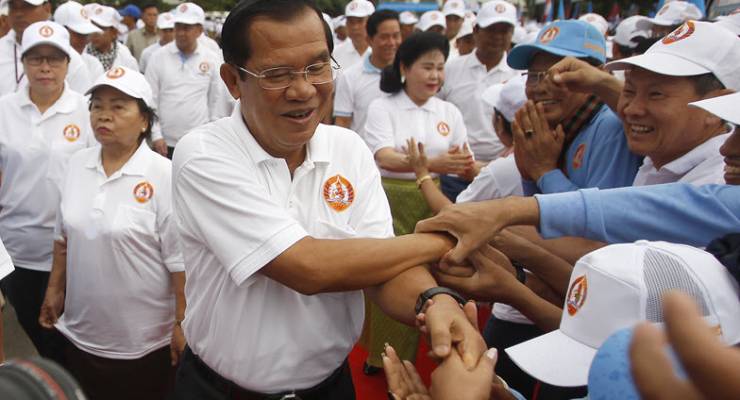
Cambodian Prime Minister Hun Sen
Cambodian Prime Minister Hun Sen, who has ruled the country for the past 33 years, is all but assured to have his tenure extended this weekend at the national elections. Meanwhile, a repressed civil society is asking what happens next.
As Human Rights Watch and a slew of other civil society organisations (CSOs) have reported, the ruling Cambodian People’s Party (CPP) has implemented a months-long crackdown on critics, independent media and the main political opposition, the Cambodian National Rescue Party (CNRP) — all of which have been shuttered, bought out, or jailed in the lead-up to the July 29 election.
“From the day the CNRP was dissolved, this election became a mockery of democracy, and a preordained victory for the ruling party,” said Human Rights Watch’s Asia Director Brad Adams.
While 19 other political parties are running in Sunday’s race, Cambodians will have to hold their nose as they vote, knowing many of the parties they are choosing from are either shills to the ruling party — such as the Cambodian Youth Party, who filed a court complaint last year to have the CNRP dissolved — or have neither the manpower nor the resources to mount an effective election campaign.
[Media independence in Cambodia takes a nose dive ahead of elections]
All the while those who contemplate boycotting the elections, voting being non-compulsory, have been faced with threats from police and the military, all closely aligned with the Prime Minister and the CPP.
A slew of international election monitors have refused to participate, saying the election will be neither free nor fair, while local civil society groups are also unwilling to legitmise the electoral process by observing in any official capacity.
Chak Sopheap, director of the Cambodian Center for Human Rights — which was almost shut down last year when the government accused them of participating in a US-backed “colour revolution” to bring down the government — said the current political climate has made it challenging for civil society to operate, but was forcing them to adapt to the new environment.
“Cambodia is undoubtedly moving away from its proclaimed democratic pathway with freedom of expression and free press slowly disappearing, civil society actors being monitored, harassed and sometimes imprisoned,” she said.
“While the current climate has significantly impaired CSOs ability to work — and endangered human rights defenders — they have learnt to adapt and found new ways to work in order to overcome the existing challenges and progress towards social justice.”
Sophal Ear, a US-based Cambodian political analyst, and author of Aid Dependence in Cambodia: How Foreign Assistance Undermines Democracy, told Crikey that encroaching influence from China in the region meant CSOs’ work will be hampered as governments continue to accept aid and investment from Beijing.
“There is no room for civil society in this context. Yet it is precisely civil society that is needed to curtail the excesses of the market and the vicissitudes of corrupt government,” he said.
Sopheap agreed that China’s growing influence in Cambodia means it will be challenging for human rights supporting nations to advocate on behalf of local CSOs. “The rise of China’s economic influence over Cambodia, its implicit support for human rights restrictions under the cover of protection of security and stability, and the resulting limited impact of other countries’ advocacy in favour of respect for human rights — which was key in complementing local advocacy efforts by Cambodian CSOs — certainly played an important role,” she said.
Given the methods the Cambodian government has used has worked so far, Kingsley Abbott, Senior Legal Adviser for the International Commission of Jurists, said in an opinion piece yesterday, it was unlikely Hun Sen will change course, and the international community’s relationship should reflect this.
“It is time for the international community to recognize that a frank and fresh analysis of the situation in Cambodia is urgently required which acknowledges the way the country’s underlying legal and constitutional framework has been deliberately altered, and the way in which this will impact the country adversely long past this month’s election.”
However, as the European Union looks to end trade preferential deals on Cambodian exports — which could decimate the Cambodian economy — and the US has imposed sanctions by blacklisting the commander of Hun Sen’s bodyguard, Sophal Ear said the new stance by the international community could potentially have lasting consequences.
“Sanctions, which have not been used to date except for visa bans and one person being blacklisted, are a new direction for the international community. The credible threat of trade preferences suspension could be a game changer. The authorities have made their bed; they need to lie in it,” he said.
As Cambodia stands at a crossroads, it seems that those who wish to uphold Cambodia’s democratic and human rights ideals will be dragged along whatever path Hun Sen chooses.
“It is impossible to know what the future after the elections holds,” Sopheap said. “What is certain, however, is that CSOs will be unable to operate and work freely towards social justice if the current legislative and political landscape persist.”
Mark Tilly currently volunteers for an NGO within Cambodia.







Any chance of a refund on our $50M refugee relocation scam.. sorry, scheme? Both of the unlucky exports have since departed for more tolerable conditions.
Nah, didn’t think so.
AR: Is your avatar that of a Mosque on the steppes of Asia?
Venise, many people have asked and you are only one to come close. Not very but more than any other.
Alas, it no longer exists. The hills are a clue.